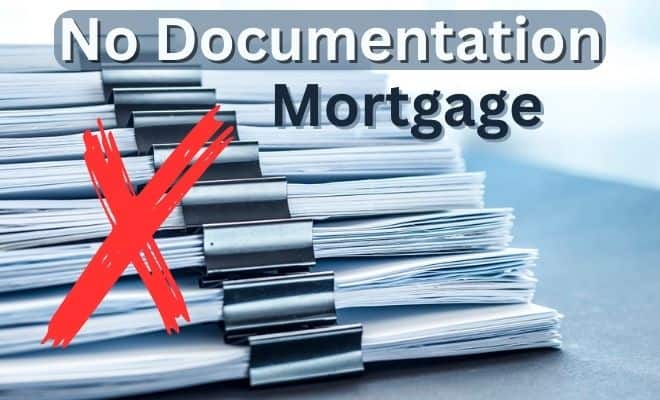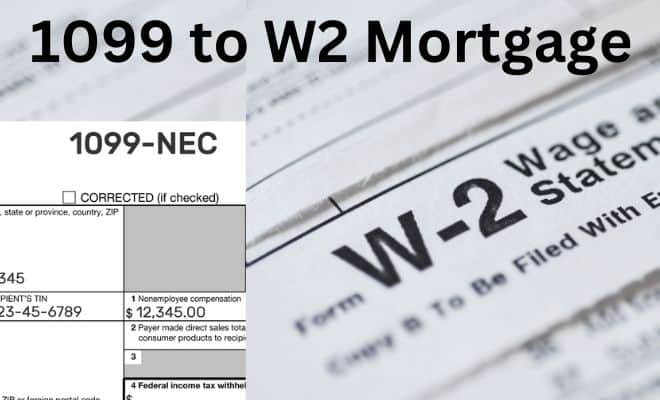No Documentation Mortgage
A no documentation mortgage is a type of loan that does not require traditional income verification or tax statements. It was more common in the past but has decreased due to stricter regulations and the 2007-2008 financial crisis. However, options are still available that utilize alternative documents like bank statements.
These loans are often granted to individuals with difficult-to-document income sources, such as self-employed individuals or those with irregular sources of income.
No documentation mortgages offer faster approval times but come with higher interest rates and much larger down payment requirements. Seek advice from a reliable lender before considering this type of loan.
Overview of No Documentation Mortgage
A no documentation mortgage is a unique type of loan that deviates from traditional mortgage lending practices. Unlike conventional mortgages that require extensive documentation to verify income, assets, and other financial details, a no documentation mortgage offers borrowers an alternative path to homeownership.
With a no documentation mortgage, borrowers are not required to provide the usual income verification documents and tax statements.
These mortgages were more prevalent in the past, but stricter regulations and the 2007-2008 financial crisis resulted in their decline. However, there are still options available for borrowers seeking a mortgage without the need for extensive documentation.
Understanding the Basics of No Documentation Mortgage
Borrowers often confuse the need for a no documentation mortgage with other programs that may require reduced documentation. This is why it is important to speak with someone about your scenario because you may find another way to qualify for the mortgage.
What is a No Documentation Mortgage?
A no documentation mortgage, also known as a no-doc mortgage, is a type of loan that doesn’t require traditional income verification or tax statements for approval. Unlike conventional mortgages, which require extensive documentation to assess the borrower’s ability to repay the loan, no documentation mortgages offer a streamlined application process by focusing on alternative factors.
How Does a No Documentation Mortgage Work?
In a no documentation mortgage, lenders evaluate the borrower’s creditworthiness primarily based on factors other than income verification. These factors may include credit scores, employment history, assets, bank deposits, and overall financial stability.
The lender may request bank statements, payment histories, and other records to gauge the borrower’s ability to manage debt and their financial discipline. The loan terms, including interest rates and down payment requirements, are typically determined based on the borrower’s perceived credit risk.
While this may not sound like you are providing “no documents”, these options are going to get your loan application across the finish line
Who Qualifies for a No Documentation Mortgage?
No documentation mortgages are designed to accommodate individuals with incomes that are challenging to document, such as self-employed individuals or those with irregular income sources. These borrowers might need help providing the traditional proof of income conventional mortgages require.
A no document mortgage is also for real estate investors who are buying the investment under an LLC or for investors with too many mortgages to qualify traditionally.
Types of No Documentation Mortgage Loans
Regarding no documentation mortgages, several options are available for borrowers. These loan types cater to individuals with unconventional or difficult-to-document income sources. Here are the different types of no documentation mortgage loans:
Stated Income Loans
- Stated income loans are available to borrowers who are unable to document income or bank deposits. Borrowers are required to state their income on the loan application without providing supporting documentation. Borrowers can be self employed, W2 wage earners, or at times unemployed. Read more about stated income loans.
Bank Statement Loans
- Bank statement loans utilize bank statements to verify a borrower’s income. Lenders review the deposits made into the borrower’s bank account over a certain period to assess their ability to repay the loan. Read more about bank statement loans.
Asset-Based Loans
- Asset-based loans are backed by the borrower’s liquid assets rather than their income. Lenders evaluate the value of the borrower’s net liquid assets, such as savings, checking accounts, stocks and 401k balances to determine their eligibility for the loan. Read more about asset based mortgages.
No Ratio Loans
- No ratio loans do not require borrowers to disclose their debt-to-income ratio. Instead, lenders evaluate other factors like credit score and employment history to assess the borrower’s ability to repay the loan. This loan is similar to a stated income loan.
No Income, No Asset Verification Loans
- No income, no asset verification loans, also known as NINA loans, do not require borrowers to provide income or asset documentation. These loans are primarily based on the borrower’s creditworthiness.
Eligibility and Requirements for No Documentation Mortgages
To qualify for a no documentation mortgage, applicants need to meet certain eligibility criteria and fulfill specific requirements. These loans are designed for individuals with unconventional income sources or need help in documenting their income. Here are some key factors to consider:
Credit Score and History
A strong credit score and credit history are heavily weighed when qualifying for a no documentation mortgage. Lenders typically look for borrowers with a credit score above a certain threshold, which may vary depending on the lender’s criteria.
It’s important to maintain good credit to increase the chances of approval. Credit scores will determine the down payment and interest rate offered.
Documentation Alternatives
Unlike traditional mortgages, no documentation mortgages offer alternatives to traditional income verification. Applicants may be required to provide alternative documentation such as bank statements, investment records, or proof of assets. These documents help lenders assess an applicant’s financial stability and loan repayment ability.
Down Payment
No documentation mortgages often require larger down payments compared to traditional mortgages. Lenders may ask for a higher percentage of the home’s purchase price as a down payment.
Debt-to-Income Ratio
While income verification may not be required, lenders may still consider a borrower’s debt-to-income ratio (DTI). This ratio compares the borrower’s monthly debt obligations to their monthly income. It helps lenders assess the borrower’s ability to manage additional debt and meet monthly mortgage payments.
The DTI calculation may be used if you are providing bank statements to qualify for the mortgage.
Pre-approval Process
We recommend getting pre-approved before speaking with a real estate agent. The pre-approval process involves submitting basic financial information to a lender who assesses the borrower’s eligibility.
Your loan officer will determine which type of no documentation loan is best for your scenario and will provide you with various options to choose from.
It is important to note that these mortgages often come with higher interest rates and greater risks. Seeking professional advice from a reputable no income documentation mortgage lender is recommended to navigate the application process and make an informed decision.
Click to speak with someone about a no documentation loan
Benefits and Drawbacks of No Documentation Mortgages
When considering a no documentation mortgage, weighing its advantages and disadvantages is essential before moving forward with the loan. While these types of loans may have certain benefits, they also come with inherent risks. Here, we explore both perspectives to help you make an informed decision.
Advantages of No Documentation Mortgages
No documentation mortgages offer several potential advantages:
- Simplified application process: Since there is no need for extensive income verification or tax documents, the application process for a no documentation mortgage tends to be more streamlined and faster.
- Flexibility for self-employed individuals: If you are self-employed or have irregular income sources, a no documentation mortgage can provide an opportunity to obtain financing without the need for traditional income verification.
- Opportunity for higher loan amounts: Depending on your financial situation, a no documentation mortgage may enable you to qualify for a higher loan than a conventional loan.
- Potential for quicker access to funds: Due to the simplified verification process, obtaining approval for a no documentation mortgage can be faster, allowing you to access the funds you need more quickly.
Disadvantages and Risks of No Documentation Mortgages
While no documentation mortgages may offer certain advantages, you should be aware of the potential drawbacks and risks:
- Higher interest rates:– Since these loans have a higher level of risk for lenders, they usually come with higher interest rates compared to fully documented mortgages.
- Increased down payment requirements: Lenders may require a larger down payment for a no documentation mortgage to mitigate the risk of lending without extensive income verification.
- Potential for stricter eligibility criteria: While no documentation mortgages cater to individuals with hard-to-verify incomes, lenders might have stricter eligibility requirements, such as higher credit scores or increased reserves.
- Risk of overextending financially: Without thorough income scrutiny, borrowers may be more prone to taking on debt they cannot afford, leading to potential financial hardships and a possible foreclosure in the future.
- Limited loan options: Since no documentation mortgages have become less common due to increased regulations, the range of lenders and loan programs available may be more limited compared to traditional mortgage options.
- Higher costs: In most instances the fees and interest rates will be much higher than conventional mortgages. This is unavoidable and often non-negotiable.
Carefully consider these factors during your application process. Ask your loan officer to explain how or why the loan option being offered makes the most sense for your specific scenario. Click to speak with someone about a no documentation loan
How to Apply for a No Documentation Mortgage
Finding a Lender
When applying for a no documentation mortgage, finding a lender experienced in these types of loans is crucial. Look for lenders who specialize in alternative documentation options and have a track record of successfully processing such loans. This is where we can help.
Preparing for the Application
Before applying for a no documentation mortgage, you must gather all the necessary information and non-income related documents. While these loans may not require traditional income verification, you still need to provide other types of documentation. This may include bank statements, investment account statements, business financial statements (for self-employed applicants), and proof of assets.
We also recommend that you take some time to improve your credit scores. We mentioned earlier how credit will decide your down payment and interest rates.
Submitting the Application
You can apply for a no documentation mortgage online which is what most lenders prefer. Follow the lender’s instructions carefully and provide all the necessary information accurately.
Required Documentation and Verification Process
When applying for a no documentation mortgage, you will need to submit specific documents for verification. Be prepared for additional scrutiny given the reduced documentation requirements. Understand that lenders may request additional documentation during the verification process to mitigate risks.
- Bank Statements: Provide several months’ worth of personal and business bank statements to verify your cash flow and reserves.
- Proof of Assets: Include documentation for any assets you may have, such as investments, real estate holdings, or valuable personal belongings.
- Credit History: The lender will request your credit report to assess your creditworthiness. Ensure your credit history is accurate and address any issues or discrepancies beforehand.
- Additional Documentation: Depending on your unique circumstances, the lender may require additional documentation to support your application, such as tax returns for previous years or proof of existing loans.
Once you have submitted all the required documentation, the lender will review your application and determine your eligibility for a no documentation mortgage.
It is important to be responsive to any requests for further information or clarification during the verification process to facilitate a smoother application journey. You also should know that your application cannot be submitted to underwriting until your loan officer has received everything from you.
Alternatives to No Documentation Mortgages
While no documentation mortgages may seem appealing for individuals seeking alternative financing options, exploring alternatives that may better suit your needs is important. Here are some alternatives to consider:
Conventional Loans with Documentation
One of the main alternatives to a no documentation mortgage is opting for a conventional loan that requires proper documentation of income, assets, and credit history.
These loans typically follow the traditional underwriting process and are less flexible when it comes to income documentation. Conventional loans generally offer more favorable terms and lower interest rates.
FHA Loans with Full Documentation
An FHA loan is more forgiving when it comes to debt to income ratios. They allow up to 56.9% DTI which is much higher than conventional loans. It is possible that you could secure an FHA approval if you are working with a lender who will allow for a high DTI.
If you were already denied by another lender for an FHA loan, find out what the DTI was when they denied your loan. If it was less than 56.9%, then speak with another lender about FHA loans.
DSCR Loans
If you are buying or refinancing an investment property, the better loan option for you could be a DSCR loan. This DSCR (debt service coverage ratio) will solely look at the property’s potential cash flow or debt service coverage by the rental income.
No tax returns or bank statements are needed for this loan and there is no limit to the number of mortgages that you can have. Read our article on DSCR lenders to learn more.
Understanding the Current Market Trends for No Documentation Mortgages
Regulatory changes have had a significant impact on the availability of no doc loans. These changes were implemented in response to the financial crisis of 2007-2008, aiming to mitigate the risks associated with these types of loans.
Impact of Regulatory Changes
The regulatory changes surrounding no documentation mortgages have resulted in stricter lending practices and increased scrutiny by financial institutions. Lenders now require more comprehensive documentation to verify borrower’s financial stability and ability to repay the loan.
Additionally, regulatory changes have also led to the implementation of standardized guidelines for loan-to-value ratios, debt-to-income ratios, and credit score requirements. These measures have improved the overall stability of the mortgage market.
One of the most significant changes was the implementation of the Ability to Repay Rule which required lenders to make sure you can afford the mortgage payments. According to the Consumer Financial Protection Bureau, the rule quote: “requires a creditor to make a reasonable, good faith determination of a consumer’s ability to repay a residential mortgage loan according to its terms.”
Available Interest Rates
Interest rates for no documentation mortgages will be a few percentage points higher than traditional mortgages. This is due to the increased risk associated with these loans, as the lender relies heavily on limited documentation.
Interest rates can vary based on factors such as creditworthiness, down payment amount, and the specific loan program chosen. Review offers from multiple lenders and choose what works best for you.
Market Outlook for No Documentation Mortgage Loans
Currently, there are still options available for borrowers who struggle to provide traditional income documentation. However, it is important to note that these loans typically come with more stringent eligibility criteria and higher upfront costs.
Borrowers should thoroughly assess their financial situation and consider all options while speaking with an educated loan officer. This individual can help borrowers navigate the current market trends and make informed decisions.
Frequently Asked Questions (FAQs) on No Documentation Mortgages
Here are some common questions and answers regarding no documentation mortgages:
What Are the Benefits of a No Documentation Mortgage?
A no documentation mortgage offers several potential benefits:
- Streamlined application process without the need for extensive documentation of income and assets
- Faster approval times compared to traditional mortgage loans
- Allows individuals with hard-to-document incomes to access financing
- Potential flexibility in income qualification requirements
Are No Documentation Mortgages Riskier than Traditional Mortgages?
Yes, no documentation mortgages generally carry higher risks:
- Lack of income verification increases the risk of borrowers overstating their financial stability
- Higher interest rates and larger down payments to offset the increased risk
- Potential for borrowers to take on larger loan amounts than they can afford
- Greater susceptibility to economic downturns and negative market fluctuations
Can Self-Employed Individuals Qualify for No Documentation Mortgages?
Self-employed individuals can potentially qualify for no documentation mortgages. Without traditional income verification, self-employed borrowers can provide alternative forms of documentation to demonstrate their financial standing, such as bank statements or proof of business ownership. However, lenders may still assess their creditworthiness and overall financial stability.
How Does a No Documentation Mortgage Impact Loan Terms and Interest Rates?
No documentation mortgages generally have higher interest rates and stricter terms compared to traditional mortgages. Lenders mitigate the higher risks associated with limited income verification by charging higher rates and requiring larger down payments. Borrowers should carefully evaluate the financial implications and consider when the benefits outweigh the potential drawbacks.
Can a No Documentation Mortgage Help Real Estate Investors?
A no documentation mortgage can be advantageous for real estate investors who have difficulty documenting their income with mortgages on multiple properties. These loans allow investors to secure financing without providing detailed income verification, making it easier for them to acquire investment properties and expand their portfolio. However, investors need to assess the risks and ensure they can sustain the financial commitments associated with no documentation mortgages.
What Are the Alternatives to No Documentation Mortgages?
Individuals who are unable to qualify for a no documentation mortgage or prefer more traditional options can consider alternatives such as:
- Conventional loans that require documentation of income, assets, and financial history
- Fully documented loans for individuals with non-traditional sources of income
- Exploring other financing options like government-backed loans or mortgages from private lenders
Is it Possible to Refinance a No Documentation Mortgage?
It is possible to refinance a no documentation mortgage. However, the availability and terms of refinancing options may vary depending on the lender and current market conditions. For example, you will have a maximum loan to value ratio allowed when refinancing to cash out equity.
Borrowers should consult with their lender and consider the potential costs and benefits before deciding to refinance. You can speak with a seasoned no doc loan officer here now





